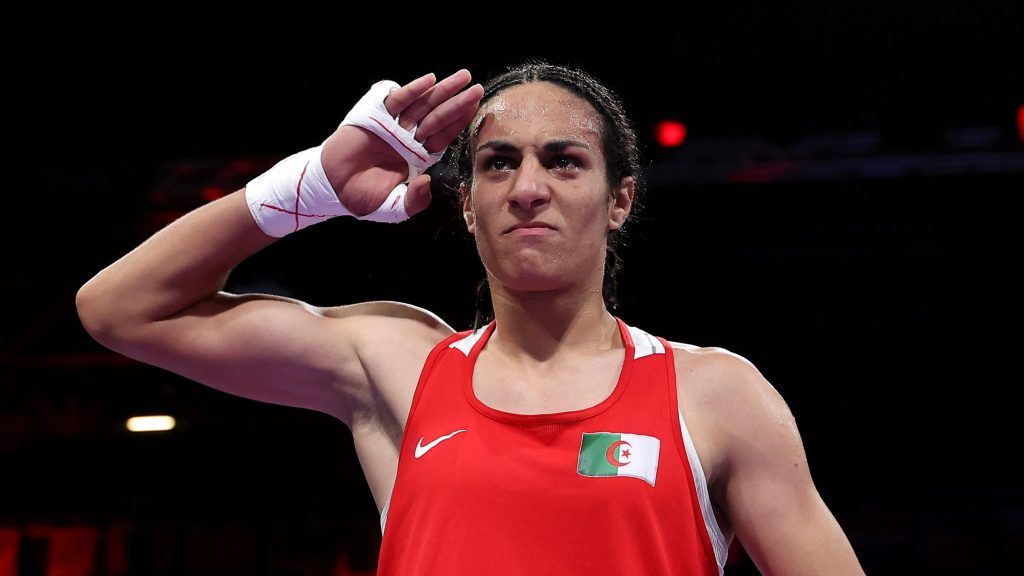Should you have watched any portion of this year’s Summer Olympics, you were sure to have heard one of NBC’s various commentators repeat some version of “It is just so great that this magical event can bring everyone together despite all our differences.” And to an extent, such a pippy comment reigned true for the vast majority of the Paris Games, the globe indeed rallying around and bonding over the most interesting storylines that emerged throughout the two-week competition. However, despite all this international camaraderie, what truly (and unfortunately) ended up dominating much of the discourse surrounding the Paris Games was the divisive topic of Algerian boxer Imane Khelif.
For those unfamiliar with her story, Khelif became the talk of the world after her round of 16 opponent in the Women’s 66-Kilogram (Welterweight) Division, Italy’s Angela Carini, confusingly resigned only 46 seconds and a few punches into their knockout-stage bout. Additionally, to make matters only more bewildering and odd, Carini not only refused to acknowledge and/or shake Khelif’s hands after her sudden resignation, but she was also notably recorded as having crumpled up and burst into tears on the floor of the ring.
However, Carini’s after-bout comments would eventually provide clarity to the puzzling situation, as the Italian boxer boldly stated, “I preferred to stop for my health. I have never felt a punch like this” in her post-fight presser. While at first glance these two sentences seemed to be nothing more than a rather innocuous statement gesturing towards the talent of Khelif, they instead took on a new, more malicious life in the media as people began to pick up on how Carini was attempting to differentiate and isolate Khelif — an athlete whose gender identity has long been questioned by many in the boxing world — from all the other female Olympic boxers. As a result, Khelif soon found herself standing demonized and alone amidst a brewing media firestorm, as conservatives across the globe picked up Carini’s cross by framing Khelif’s victory as the paradigmatic example of why transgender individuals should not be allowed to compete or even exist.
Yet, the kicker to all of this hatred sent towards Khelif is that she is not transgender. Despite all the long-standing and rampant rumors about her having transitioned from male to female, Khelif has lived out her entire life as a cisgender woman who has never once identified as a man. In fact, Khelif would not have been allowed to compete under Algeria’s flag should she have been transgender, as the current government’s penal codes label undergoing any sort of gender transition as a rather serious criminal offense. However, despite the existence of these easily researchable facts, the false claims around Khelif still ran wild as a glut of critics pushed their questionable narratives and thinly-veiled transphobia without remorse, many relying upon a rather questionable and unverified 2023 ruling made by the now discredited International Boxing Association (IBA) in reference to Khelif’s biological and chromosomal makeup and Khelif’s more masculine appearance in their attempts to discredit her.
However, all this begs the question: So what? Does it really matter if the eventual gold medalist in the women’s welterweight division was falsely accused of being transgender? What bearing does this situation actually have on our lives?
Besides the obvious sociopolitical significance of this incident — in that we apparently need significantly more media literacy training, more focus on reducing and destigmatizing non-cisgender means of identifying and a deeper understanding that sex and biology both, rather paradoxically, exist as engendered items on a spectrum — this incident may have some rather lasting harmful effects on the world of women’s sports.
Take, for example, what actually happened to Carini and what she did. During the time leading up to her fight, she was certain to have caught wind of all the rumors surrounding Khelif, and after she was forced to sit with them for a while, regardless of however false they turned out to be, it seems that they were enough to severely rattle her and cause her to fret for her own safety. In essence, per Carini’s own words, everything “had gone up in smoke” for her, her opportunity to stand atop the sporting world being ruined by the paranoia that false narratives about trans athletes, or rather the potential and prevalence thereof, had effectively fueled.
Think about this for a minute. If Carini is willing to throw away a chance at an Olympic gold medal over these rampant lies about trans athletes jeopardizing cisgender athletes’ safety, then what’s to stop younger women from also turning away from athletics over concerns for their safety? It’s important to note that the lies around Khelif were insanely generalized when it came to their content, with figures like Jesse Watters, America’s most-watched news anchor, painting the issue of “the prevalence and existence of trans athletes” as much broader than just Khelif: “Women’s sports are being wrecked. Girls are in physical danger… Someone is going to die.” On a personal level, I certainly would shy away from competing in sports if all I heard from certain sectors of the media is that, should I compete, I will end up facing individuals who are only going to hurt me because they are genetically bigger, faster and stronger, and I have to imagine that the young women of the world (and their parents) could potentially feel the same way. Thus, consequently, these false narratives being pushed about trans athletes being allowed to compete wherever and whenever without any sort of oversight are not simply white lies told to win points in a culture war, but rather they present a serious danger to something outside the American political vacuum: the future of women’s sports.






































































































































































































